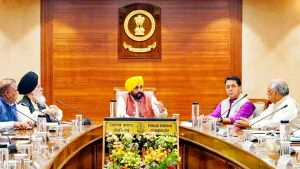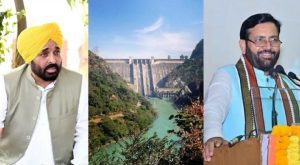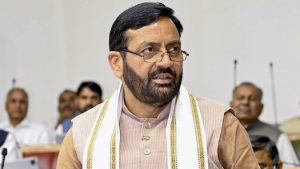Punjab – In an unprecedented show of political unity, leaders across party lines in Punjab have taken a firm stand in the ongoing Punjab water dispute with neighboring Haryana. On Friday, representatives from seven political parties unanimously resolved not to release even “a single drop” of additional water to Haryana from the Bhakra dam, defying the recent directive from the Bhakra Beas Management Board (BBMB).
The two-hour meeting, chaired by Punjab Chief Minister Bhagwant Mann, resulted in a collective decision to approach Prime Minister Narendra Modi over this contentious Punjab water dispute that has been simmering between the two states for decades. The meeting demonstrated rare political consensus in Punjab politics, with opposition parties backing the state government’s position on protecting water resources.
“This order to release water to Haryana is being forced upon Punjab,” declared CM Mann after the meeting. “All parties are united on safeguarding our state’s waters.” The chief minister emphasized that following the discussions, the government would prepare a comprehensive plan of action to address the Punjab water dispute and protect Punjab’s water rights.
Also Read: Nitish Kumar NDA Pledge: Powerful Declaration Ends Political Flip-Flops
Political Unity Transcends Party Lines in Water Crisis
The Punjab water dispute has achieved what few political issues have managed in recent years – complete unity across Punjab’s political spectrum. Representatives from the Aam Aadmi Party (AAP), Congress, Bharatiya Janata Party (BJP), Shiromani Akali Dal (SAD), and other regional parties presented a united front during and after the meeting.

What makes this solidarity particularly noteworthy is the participation and support of Punjab BJP president Sunil Jakhar and senior BJP leader Manoranjan Kalia, despite the BJP being in power in neighboring Haryana. Both leaders reinforced that “Punjab had no water to spare for Haryana” and assured that the state BJP unit would fully support the Punjab government’s position in this Punjab water dispute.
“This injustice will not be tolerated,” stated Jakhar, though he added that “confrontation should have been avoided.” The BJP’s alignment with the state government on this issue demonstrates the critical nature of water resources in Punjab’s agricultural economy and political landscape.
Historical Context of the Punjab-Haryana Water Sharing Issue


The current Punjab water dispute has deep historical roots dating back to the reorganization of Punjab in 1966 when Haryana was carved out as a separate state. Water-sharing arrangements between the two states have remained contentious ever since, with multiple agreements, court cases, and political interventions failing to resolve the fundamental disagreements.
The Bhakra dam, constructed across the Sutlej River, has been at the center of this decades-long Punjab water dispute. Punjab has consistently maintained that river waters are state subjects under the Constitution, and as a riparian state, it has primary rights over the waters of rivers flowing through its territory.
Haryana, on the other hand, claims entitlement to water based on agreements made during the state’s formation and subsequent water-sharing arrangements. The BBMB, which manages the Bhakra-Nangal and Beas projects, has often found itself caught between the competing claims of both states in this enduring Punjab water dispute.
BBMB Order and Punjab’s Response
The immediate trigger for the current escalation in the Punjab water dispute was the BBMB’s directive ordering Punjab to release additional water to Haryana. The order came amid reports of water shortages in parts of Haryana, particularly affecting agricultural activities in the state.
Punjab officials argue that the state itself is facing water scarcity, with groundwater levels depleting at alarming rates across many districts. Environmental experts supporting Punjab’s position in the Punjab water dispute point to studies showing that Punjab’s groundwater is being extracted at unsustainable rates, primarily due to intensive agricultural practices focused on water-intensive crops.
“Punjab is already a water-stressed state,” noted a senior water resources department official who attended the all-party meeting. “Releasing additional water when our own farmers are struggling would be environmentally and economically disastrous,” he added, highlighting the critical nature of this Punjab water dispute for the state’s agricultural sector.
Economic Implications of the Water Conflict
The Punjab water dispute has significant economic implications for both states, which rely heavily on agriculture as a major economic activity. Punjab, often called India’s “breadbasket,” contributes substantially to the country’s food security, with its agricultural productivity dependent on irrigation from rivers and groundwater.
Agricultural economists point out that any reduction in water availability due to this Punjab water dispute could severely impact crop yields in Punjab, potentially affecting not just the state economy but also national food grain reserves. The state’s farmers, already facing challenges from declining groundwater tables and rising input costs, view the water-sharing issue as existential.
For Haryana, access to water from the Bhakra dam system is equally crucial for its agricultural and industrial development. The state has invested significantly in canal infrastructure based on expected water allocations, and any shortfall affects thousands of farmers across multiple districts. This creates a difficult balancing act in the Punjab water dispute with competing legitimate needs on both sides.
Legal Framework and Constitutional Aspects
The legal dimensions of the Punjab water dispute involve complex interpretations of constitutional provisions, interstate water-sharing principles, and various agreements signed over the decades. Water is a state subject under the Constitution, but interstate river disputes fall under the Union government’s purview through mechanisms like river water tribunals.
Punjab has consistently maintained in this Punjab water dispute that as per the riparian principle, states through which rivers naturally flow have primary rights over those waters. The state has also cited the Punjab Reorganisation Act and subsequent modifications to bolster its claims.
Legal experts note that the Punjab water dispute represents a classic conflict between riparian rights and equitable distribution principles in water law. While Punjab claims natural right to its rivers, Haryana argues for equitable distribution based on population and needs, highlighting the complexity of resolving interstate water conflicts within India’s federal structure.
Planned Approach to Prime Minister Modi
Following the all-party meeting, Punjab leaders announced their intention to seek an audience with Prime Minister Narendra Modi to present the state’s case in this Punjab water dispute. The delegation would include representatives from all major political parties, demonstrating the issue’s significance beyond partisan politics.
“We will collectively present Punjab’s perspective and concerns to the Prime Minister,” said CM Mann. “This is not a political issue but a matter of Punjab’s survival and rights.” The delegation hopes that central intervention could help find a sustainable solution to the Punjab water dispute that addresses both states’ concerns.
Political analysts suggest that taking this Punjab water dispute directly to the Prime Minister indicates both the seriousness of the situation and Punjab’s strategic approach to seeking resolution at the highest level of government rather than relying solely on legal mechanisms or the BBMB’s decisions.
Environmental Considerations and Sustainable Solutions
Beyond the political and legal dimensions, the Punjab water dispute raises important questions about sustainable water management in an era of climate change and environmental degradation. Both Punjab and Haryana face declining groundwater levels, erratic rainfall patterns, and increasing water demand from growing populations and economic activities.
Environmental experts suggest that long-term resolution of this Punjab water dispute requires moving beyond zero-sum approaches to water sharing. They advocate comprehensive river basin management, improved irrigation efficiency, crop diversification away from water-intensive varieties, and investment in water conservation technologies.
“The current water crisis isn’t just about distribution but about sustainability,” noted an environmental policy researcher familiar with the Punjab water dispute. “Both states need to reconsider their agricultural and water use patterns to ensure long-term water security.”
Final Word: Path Forward in the Interstate Water Conflict
As tensions continue to rise in this Punjab water dispute, the path forward remains uncertain. Punjab’s unified political stance signals that the state is prepared to strongly defend its water rights, while Haryana is equally determined to secure its claimed share of the Bhakra dam waters.


The central government’s response to Punjab’s upcoming representation will be crucial in determining whether this Punjab water dispute moves toward resolution or further escalation. While political negotiations continue, experts emphasize that technical solutions, environmental considerations, and cooperative approaches will be essential for any sustainable outcome.
What remains clear is that water resources have become increasingly precious and contested in this region, making the Punjab water dispute not just a political issue but a fundamental challenge for sustainable development and interstate relations in northern India.

